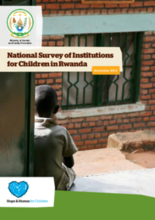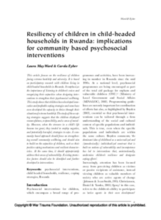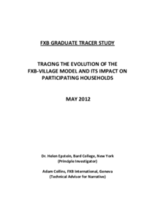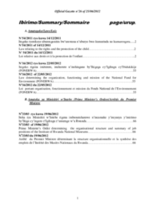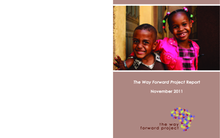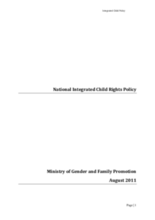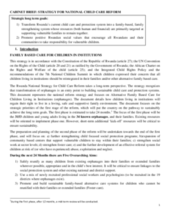This country page features an interactive, icon-based data dashboard providing a national-level overview of the status of children’s care and care reform efforts (a “Country Care Snapshot”), along with a list of resources and organizations in the country.
demographic_data
childrens_living_arrangement
children_living_without_bio
adoption
social_work_force
key_stakeholders
Key Stakeholders
Add New DataOther Relevant Reforms
Add New Datadrivers_of_institutionalisation
Drivers of Institutionaliziation
Add New Datakey_research_and_information
Key Data Sources
Add New DataReport on National Assessment of Centres caring for Children with Disabilities in Rwanda
National Integrated Child Rights Policy
Country Care Review: Rwanda
Prevalence and number of children living in institutional care: global, regional, and country estimates
The Way Forward Project Report
Community-Based Child Protection Mechanisms in Refugee Camps in Rwanda: An Ethnographic Study
Displaying 151 - 160 of 188
Hope and Homes for Children, in partnership with the Ministry of Gender and Family Promotion (MIGEPROF), has conducted a national survey of all institutions for children in Rwanda to obtain an accurate picture of the current institutional system and the children living within it which can be used to inform decision-making regarding the implementation of the reform strategy and provide a baseline against which progress can be measured in the future.
2014 is the time line set to re-unite orphaned children with their families. Already in a period of seven months, two orphanages have been phased out. Officials from the National Commission for Children (NCC) say that in less than two months, two more of the 34 targeted orphanages will have been closed.
Based on participatory research with children living in child headed households in Rwanda, this article focuses on the resilience of children facing extreme hardship and adversity. While the research focuses on child headed households, this study’s findings can be considered more broadly for interventions for other vulnerable children to support their development of innovative coping strategies.
Study tracing impact of FXB International's community-driven “FXB-Village” model on graduates of the program. The models is a structured program of household support and economic strengthening designed to empower particularly vulnerable families to escape extreme poverty and ensure the enduring wellbeing of the children in their care.
This study was designed to illuminate the different manifestations of transactional sexual exploitation and abuse among Rwanda's children in order to inform effective responses by policies, programs, and communities.
In the next few years, the Rwandan government hopes to close the majority of the country’s children’s homes. Rwanda’s so-called "child deinstitutionalization" (DI) policy, which, despite initial concerns, is attracting global support.
This Law is relating to the rights and the protection of the child in Rwanda.
The Congressional Coalition on Adoption Institute’s The Way Forward Project brought together a group of international experts to discuss opportunities and challenges facing governmental and non-governmental organization leaders in six African nations (Ethiopia, Ghana, Kenya, Malawi, Rwanda, and Uganda) as they work to develop systems of care that serve children in and through their families.
The Integrated Child Rights Policy is conceived with the objectives of strengthening the thinking and analysis around policies related to children and the coordination and implementation of Government activities for realization of children’s rights.
This brief was prepared by the Rwandan Ministry of Gender and Family Promotion (MIGEPROF), requesting the Cabinet to approve the proposed child care reform strategy and to support its implementation.

